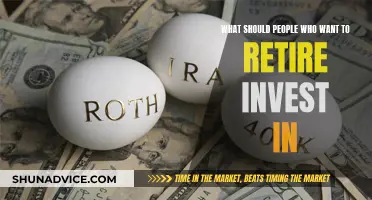
Ethical investing is a way to ensure your retirement investments aren't supporting activities that conflict with your values. It involves choosing investments based on an ethical code, such as religious or social values, and financial returns. The idea is to support industries that have a positive impact, such as those focused on sustainable energy, and often aligns with ESG (Environmental, Social, and Governance) investing.
The performance of ethical funds has been comparable to that of traditional funds, and some research even suggests superior returns. According to Morningstar data, sustainable funds outperformed their traditional peers in 2019, with 66% finishing the year with returns in the top half of their Morningstar categories.
However, the concept of ethical investing is complex, and what is considered ethical varies from person to person. It is important to understand the methodologies used by funds or advisors when selecting investments, as the terms sustainable or socially responsible can be used loosely.
To build an ethical investment portfolio, individuals can either take a hands-on approach by selecting specific investments or utilise robo-advisors, which employ algorithms to construct portfolios based on ethical preferences, risk tolerance, and goals.
| Characteristics | Values |
|---|---|
| Definition | An investment strategy in which an investor chooses investments based on an ethical code, such as religious or social values, and financial returns |
| Ethical investing vs. SRI vs. ESG | Ethical investing has lots of variations, including sustainable investing, socially responsible investing, or SRI, green investing, impact investing and ESG investing |
| Ethical funds performance | The performance of ethical funds has been shown to be similar to the performance of traditional funds — in fact, some research shows that ethical fund performance may be superior |
| Ethical funds market risk | There is some evidence that suggests that ethical funds may offer lower levels of market risk than traditional funds, even in volatile markets |
What You'll Learn

Environmental, Social and Governance (ESG) criteria
The environmental criteria look at how a company safeguards the environment. This includes a company's use of energy, waste, pollution, natural resource conservation, and treatment of animals.
The social criteria examine how a company manages relationships with internal and external stakeholders, including employees, suppliers, customers, and communities. This includes human rights observance, compliance with labour standards, customer satisfaction, data protection, promotion of gender equality and diversity, employee engagement, and community relations.
The governance criteria refer to how a company is led and managed. This includes leadership, executive pay, audits, internal controls, shareholder rights, and transparency in accounting methods.
ESG criteria are used to screen investments and encourage companies to act responsibly. Many investment firms and mutual funds offer financial products that follow ESG investing strategies.
ESG criteria are not just a checkbox exercise but an integral part of modern business strategy. They can add significant value to a company's operations and are seen as key indicators of a company's potential for long-term success.
Altcoin Investment: Best Picks
You may want to see also

Socially Responsible Investing (SRI)
SRI has become prominent in the investing landscape, with over $12 trillion invested in SRI assets in the United States alone, according to the U.S. SIF Foundation's 2018 report. SRI assets have grown at a rapid pace, with nearly 40% year-over-year growth since 2016. This trend reflects investors' increasing desire to align their investments with their values.
SRI involves supporting companies that share your values and avoiding investments in industries or companies that contradict your beliefs. For example, SRI mutual funds typically avoid investing in tobacco, gun manufacturers, or the fossil fuel industry. It's about ensuring your retirement investments aren't supporting activities that conflict with your principles.
SRI is often associated with Environmental, Social, and Governance (ESG) standards, which rate companies on their environmental sustainability practices, ethical management, leadership, executive pay, audits, internal controls, and shareholder rights. ESG criteria are used by third-party agencies to assign ESG ratings to companies, allowing investors to screen potential investments.
While SRI and ESG are related, they are not identical. ESG is a newer approach to SRI and provides a more structured framework for evaluating investments. However, critics argue that the lack of standardised metrics and methodologies across rating agencies can lead to inconsistent outcomes.
When considering SRI, it's essential to understand your values and priorities. Determine the causes you want to support and the companies whose practices align with those values. SRI may involve both including specific investments and excluding others.
To build an SRI portfolio, you can choose to build it yourself by selecting individual investments or use robo-advisors, which employ algorithms to construct portfolios based on your risk tolerance, goals, and ethical preferences. Robo-advisors like Betterment, Wealthfront, and Ellevest offer socially responsible portfolios.
It's worth noting that the performance of ethical funds, including SRI, has been comparable to or even superior to traditional funds. According to Morningstar data, sustainable funds outperformed their traditional peers in 2019, and ESG index funds demonstrated lower market risk during the initial months of the COVID-19 pandemic.
Why People Avoid Investing
You may want to see also

Sin stocks
When it comes to retirement, investing ethically can be a way to "do well by doing good". Socially responsible investing (SRI) means supporting companies that align with your values and avoiding those that don't. This could mean investing in companies that help the environment, social justice, or fair employment, and avoiding those involved in tobacco, firearms, or gambling.
Now, this is where "sin stocks" come in. Sin stocks are shares of publicly traded companies involved in or associated with activities that are considered unethical or immoral. These are generally sectors that deal directly with morally dubious actions and are perceived as making money by exploiting human weaknesses and frailties.
Sin stock sectors typically include alcohol, tobacco, gambling, sex-related industries, and weapons manufacturers. However, definitions can vary widely across the globe, depending on regional and societal expectations. For example, alcohol stocks are not necessarily considered sin stocks everywhere, as brewing has a long tradition in much of the world. Similarly, some people may include all military contractors, while others may view supporting the military as a patriotic duty.
The very nature of sin stock businesses ensures they have a steady stream of customers, as their products have inelastic demand. This means that if prices go up, customers typically don't reduce their consumption by a corresponding amount. For instance, if the price of cigarettes or beer increases by 20%, smokers won't smoke 20% fewer cigarettes, nor will beer enthusiasts drink 20% less beer. As a result, these businesses are often thought to be recession-proof.
Additionally, sin stock industries are often highly regulated, and the social and regulatory risks involved tend to discourage competitors from entering the market. This adds to the downside protection for these stocks, ensuring fat margins and stable profits.
However, sin stocks also face far greater political risk than most other stocks. They are at a higher risk of being declared morally bankrupt and forced out of business. For example, prohibitions on drugs and alcohol in the U.S. during parts of the 20th century would have seemed very strange just a couple of centuries earlier. The public began to associate alcohol and drugs with various crimes in the 19th century before these bans took place.
Even when sin stocks are not outlawed, they are more likely to be subjected to sin taxes. There are both political and economic arguments supporting these taxes. Politically, many conservatives are generally opposed to taxes but are willing to vote for taxes on behaviour they consider immoral. Economically, whenever a good or service is taxed, some people will reduce consumption, which can be argued to benefit the community—for example, lower tobacco consumption can improve health and reduce medical expenses.
In summary, sin stocks can be a controversial addition to investment portfolios, and their ethical implications are open to interpretation. While they may provide stable profits, they also carry greater political risks and the potential for negative public perception and consumer backlash.
Backpack Wheels: Invest in Comfort
You may want to see also

Impact investing
Impact investments can be made in both emerging and developed markets, and investors can target a range of returns, from below market to market rate or above, depending on their strategic goals. The impact investing market provides capital to address some of the world's most pressing challenges, including sustainable agriculture, renewable energy, conservation, microfinance, and affordable and accessible basic services such as housing, healthcare, and education.
The practice of impact investing is underpinned by a commitment to measuring and reporting the social and/or environmental performance and progress of underlying investments, ensuring transparency and accountability. This measurement and reporting are essential to inform the practice of impact investing and build the field.
A wide range of investors are attracted to impact investing, including individuals, banks, pension funds, financial advisors, wealth managers, institutional and family foundations, government investors, and development finance institutions.
According to a 2020 survey by the Global Impact Investing Network (GIIN), the majority of investors who choose impact investing look for market-rate returns. A 2021 study showed that the median impact fund realized a 6.4% return, compared to 7.4% from non-impact funds. While impact investing may result in slightly lower returns than the market average, it is important to note that impact investing is a long-term strategy that seeks to balance financial gains with positive social and environmental outcomes.
Invest in Us: The Human Advantage
You may want to see also

ESG funds
ESG stands for environmental, social, and governance factors. These are the criteria that companies can choose to apply to their operations.
ESG standards rate how a company supports environmental sustainability, how it promotes ethical management practices, leadership, executive pay, audits, internal controls, and shareholder rights.
Some examples of ESG funds include:
- Vanguard ESG U.S. Stock ETF (ESGV)
- Pimco Enhanced Short Maturity Active ESG ETF (EMNT)
- Nuveen ESG Dividend ETF (NUDV)
- IShares MSCI Global Sustainable Developmental Goals ETF (SDG)
- Fidelity U.S. Sustainability Index Fund (FITLX)
- Calvert US Mid Cap Core Responsible Index Fund (CMJAX)
- BlackRock Sustainable Advantage CoreAlpha Bond Fund (BIAAX)
While ESG funds can be a great way to invest ethically, it's important to note that they do not guarantee superior financial returns.
Boyfriend's Priorities: Others First
You may want to see also
Frequently asked questions
Ethical investing is a practice of selecting investments based on an ethical code, such as religious or social values, and financial returns. Ethical investors tend to avoid investments in companies involved with stigmatised activities, such as gambling, alcohol, tobacco, or firearms.
First, determine your values and priorities. Then, decide how involved you want to be in the process. You can either build your own portfolio or get help from robo-advisors. Robo-advisors are often cheaper than traditional advisors and can help you build a portfolio that aligns with your values.
ESG stands for Environmental, Social and Governance. It is a set of criteria that companies can choose to apply to their operations. ESG standards rate how a company supports environmental sustainability, ethical management practices, leadership, executive pay, audits, internal controls, and shareholder rights. Investors can use ESG criteria to screen potential investments.







